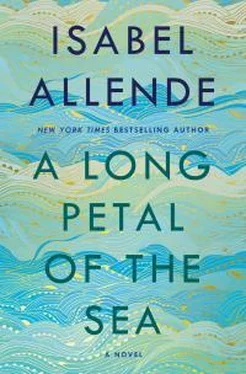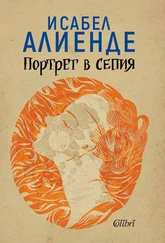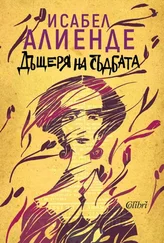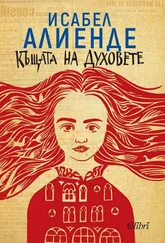The news on the radio, in the papers, and from the loudspeakers in the streets was always optimistic. The air was filled with the militias’ songs and the incendiary speeches of La Pasionaria: better to die on one’s feet than to live on one’s knees. There was never any talk of an enemy advance: it was always called a tactical withdrawal. Nor was there any mention of the rationing and shortages of almost everything, from food to medicine. Victor Dalmau gave his family a more realistic account than the one from the loudspeakers. He could judge how the war was going by the trainloads of wounded and the numbers of dead that mounted up tragically in the hospital. “I have to get back to the front,” Guillem would say, but couldn’t even get his boots on before collapsing back on the bed, exhausted.
The daily rituals of caring for Guillem through the miseries of typhus, washing him with a sponge, emptying the chamber pot, feeding him with spoonfuls of a child’s pap, watching over his sleep and then washing him again, emptying the pot, and feeding him in an endless routine of concern and affection, only strengthened Roser’s conviction that he was the only man she could love. She was sure there could be nobody else.
On the ninth day of his convalescence, seeing how much better he looked, Roser understood she had no more excuses for keeping him in bed, where she could have him all to herself. Guillem would very soon have to return to the front. There had been such huge losses in the past year that the Republican Army was recruiting adolescents, old men, and evil-looking prisoners who were given the choice of either going to the front or rotting in jail. Roser announced to Guillem that it was time for him to get up, and the first step would be a good bath. She heated water in the biggest pan in the kitchen, helped Guillem into the washtub, soaped him from his hair down to his feet, and afterward rinsed him and dried him until he was pink and shiny. She knew him so well by now that she didn’t even notice his nakedness. For his part, Guillem was no longer embarrassed in front of her; in Roser’s hands he was returning to childhood.
I’m going to marry her when the war is over, he told himself in a moment of profound gratitude. Until then, nothing had been further from his mind than putting down roots and getting married. The war had saved him from planning any possible future. I’m not made for peace, he had told himself, far better to be a soldier than a factory worker—and what else could he do with no education and such an impetuous character? But Roser, with her freshness and innocence, her unflagging kindness, had gotten under his skin. The image of her accompanied him in the trenches, and the more he remembered her, the more he needed her and the prettier she seemed. In the worst days of typhus, when he was drowning in a tide of pain and fear, he clung desperately to Roser to stay afloat. In his confused state, his only compass was her concerned face leaning over him; his only anchor her wild eyes that suddenly became smiling and gentle.
This first bath in the washtub brought Guillem back to the land of the living, after many days sweating at death’s door. He returned to life thanks to being rubbed with the soapy cloth, the foam in his hair, the buckets of warm water, and Roser’s hands on his body, the hands of a pianist: strong, gentle, precise. He surrendered completely, thankfully. She dried him, helped him into a pair of his father’s pajamas, shaved him, and cut his hair and his fingernails, which had grown into claws. Guillem still had sunken cheeks and red eyes, but he was no longer the scarecrow who had arrived at the house dragged along by two militiawomen. Then Roser heated what was left of the coffee from breakfast and poured in a splash of brandy, to give herself courage.
“I’m ready for us to go out and dance,” said Guillem when he saw himself in the mirror.
“You’re ready to go back to bed,” announced Roser, handing him a cup. “With me,” she added.
“What did you say?”
“You heard.”
“You can’t be thinking of…”
“Of exactly the same as you ought to be thinking,” she replied, pulling her dress up over her head.
“What are you doing? Mother could be back at any minute.”
“It’s Sunday. Carme is dancing sardanas in the square, and then she’ll go and line up at the telephone exchange to call Victor.”
“I might infect you…”
“If you didn’t infect me at the start, it’s not likely to happen now. That’s enough excuses. Get a move on, Guillem,” Roser ordered him, slipping off her bra and panties, and pushing him aside to get into bed.
Never before had she appeared naked in front of a man, but she had lost her shyness in these days of being forced to live with rationing, in a permanent state of alert, mistrusting neighbors and friends, with the angel of death always hovering nearby. Her virginity, so prized at the nuns’ school, now weighed on her at twenty like a blemish. Nothing was certain; the future did not exist; all they had was this moment to savor before the war snatched it from them.
—
DEFEAT BECAME CLEAR WITH the battle of the River Ebro. It began in July 1938, lasted four months, and left more than thirty thousand dead. Among them would be Guillem Dalmau.
The Republicans’ situation was desperate: their only hope was that France and Great Britain would intervene on their behalf, but the days went by without any sign of this happening. In order to gain time, the Republicans concentrated all their efforts and the bulk of their troops in a crossing of the River Ebro. The idea was to thrust into enemy territory and occupy it, seize their supplies and ammunition, demonstrate to the world that the war was not lost and that with the necessary aid, Spain could defeat Fascism. Eighty thousand men were transported stealthily by night to the eastern bank of the river. Their task was to cross it and confront the enemy forces, who were far superior in numbers and weaponry. Guillem was part of the mixed brigades of the 45th International Division, fighting alongside English, American, and Canadian volunteers. They were the advance guard, the shock troops, what they themselves called the cannon fodder. They were fighting in rugged terrain and with harsh summer weather, the enemy in front of them, the river at their backs, and German and Italian planes in the skies above them.
This surprise attack gave the Republicans an initial advantage. Arriving at the front, the soldiers crossed the river on improvised craft, pulling along terrified, loaded-down mules. The engineers built pontoon bridges that were bombed by day and replaced by night. In the vanguard, Guillem spent days with no food or water when the supply chain failed. He went weeks without bathing, sleeping on the rocks, sick from sunstroke and diarrhea, constantly exposed to enemy fire, mosquitoes, and rats that ate anything they could find and attacked anybody who fell. The hunger, thirst, churning guts, and exhaustion were made worse by the fierce summer heat. Guillem was so dehydrated he no longer produced any sweat. His skin was burned, cracked, and blackened, as leathery as a lizard’s. He sometimes spent hours crouching, rifle in hand, jaws clenched, every fiber of his body taut as he waited for death, until his legs gave out under him. He thought he must have been weakened by the bout of typhus, and was no longer as strong as he once had been. His comrades were falling at a terrifying rate, and he wondered when it would be his turn. The wounded were evacuated at night in vehicles without lights to avoid being strafed by enemy planes; some of the most badly wounded begged to be given the coup de grâce, because the possibility of falling into enemy hands was worse than a thousand deaths. The bodies that couldn’t be removed before they began to stink under the merciless sun were covered with stones or burned, as were the horses and mules: it was impossible to dig graves in this rocky ground, where the earth was as hard as cement. Guillem risked exposure to bullets and grenades to reach the bodies and rescue some kind of personal item to send back to their families.
Читать дальше











